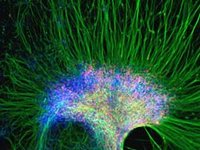Age of Acquisition
 Do you learn best what you learned first? Evidence supporting the Age of Acquisition effect (Zevin & Seidenberg, 2002) would suggest so: in some cases, you show better reading performance on words you learned early in life, even controlling for the effect of cumulative exposure frequency.
Do you learn best what you learned first? Evidence supporting the Age of Acquisition effect (Zevin & Seidenberg, 2002) would suggest so: in some cases, you show better reading performance on words you learned early in life, even controlling for the effect of cumulative exposure frequency.Computational models were used to investigate this phenomenon, because they allow for precise control of properties that are normally confounded in behavioral work, such as word frequency and word length. Age of acquisition was not seen among words that are typical in terms of orthography and phonology of english, but was seen in a test in which the words chosen differed substantially in their orthography to phonology mappings. AoA effects would thus be expected in any situations where learning the name for one pattern does not help you in learning the name for another pattern, such as in the mappings from semantics to phonology. In the case of orthography to phonology, however, this is frequently not the case.
Connectionist principles suggest that there should be a differential effect of age of acquisition, such that initially there is a large advantage for early-learned words, because regularities across pronounciation have not yet been fully extracted from experience. However, as the weights become entrenched in representing these regularities over the course of experience, the disadvantage conveyed by learning words late decreases. Accordingly, there are two factors to consider: cumulative frequency and frequency trajectory. Controlling for cumulative frequency, this account would suggest that there should be an advantage for words trained with a high frequency early, relative to those words trained with high frequency later in development.
To test these predictions, authors Zevin and Seidenberg used a four layer network with 100 input orthographic units, 20 hidden units, and a 250 output phonological units. In addition, a second hidden layer was bidirectionally connected only with the output units, which serve essentially to "cleanup" phonological production in a way that is not possible purely through orthographic to phonological mapping.
The results show the expected trend only when the words to be learned differ in their orthography to phonology mappings. This is relatively unlikely to occur in a language such as English, which has a relatively consistent orthography to phonology mapping, unlike, say Kanji. However, Age of Acquisition effects are more likely to be seen in tasks involving semantic to phonological mapping. To my knowledge, this prediction has not yet been confirmed behaviorally, nor has the distinction been verified in simulations, despite following naturally from the work presented here. Batter up!


5 Comments:
thanks for the link on that picture, where do you keep getting these cool connectivity pictures? i like seeing those to get a better feel for the overall wiring in the brain. If you have more, or maybe a post with a few links would be cool.
thanks for the link on that picture, where do you keep getting these cool connectivity pictures? i like seeing those to get a better feel for the overall wiring in the brain. If you have more, or maybe a post with a few links would be cool.
haha, glad you like the pictures. I have no idea where this one is from. Just search for "diffusion tensor" or anything involving tensors and you'll get cool connectivity images.
i read an article in *insert journal name here that i forgot* about cultural differences in the reported age of first memory as a function of storytelling within families. basically, maori kids report a first memory at (trying to remember here) 24 mos, americans at about 36 mos and koreans at 48 mos.
they hypothesize that repetition via storytelling is the reason. sounds purty hebbian to me. just thought you might be interested.
Hey Dan - that's really fascinating; we were just covering infantile amnesia in one of my classes a few days ago. One of the biggest problems is verifying that the memories from infancy are legitimate and were not acquired later. Nonetheless, if it's possible for humans to remember something from those young ages, I have no doubt that you're correct in that storytelling would play a large part, through some kind of hebbian mechanism!
Very interesting.
Post a Comment
<< Home